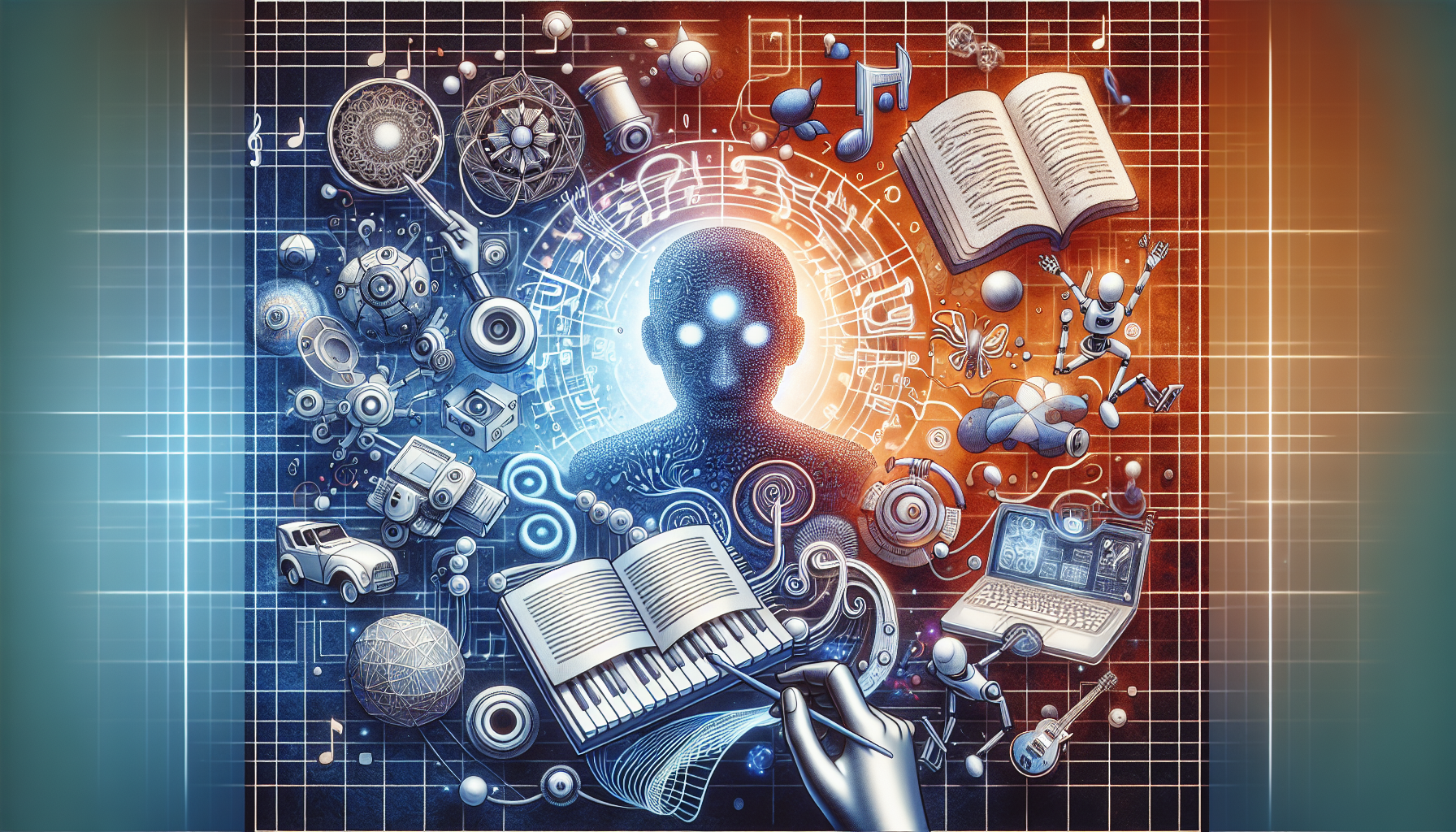The Influence of AI on Creative Sectors: Changes in Music, Writing, and Visual Arts
Artificial Intelligence (AI) has evolved beyond its origins in automation and data management to significantly alter creative sectors. As AI progresses, its involvement in music, writing, and visual arts raises an essential question: is AI enhancing creativity or replacing it?
AI in Music
From Classical to Computational
The music sector is undergoing a transformation with the incorporation of AI. Applications like AIVA, Amper Music, and Google’s Magenta are equipping musicians to produce complex soundtracks and delve into new genres. These platforms assess vast musical libraries, creating harmonious pieces either autonomously or alongside artists.
Artists like Taryn Southern and Holly Herndon have adopted AI as a co-composer. Herndon’s project “PROTO” showcases a neural network trained on her voice, representing a distinctive synthesis of human and AI collaboration. AI is redefining sound design, aiding live performances, and enabling instant music creation, thus reshaping the music landscape.
AI in Writing
Code That Narrates
From news reporting to poetry, AI is leaving its imprint on the realm of written expression. Language models such as GPT-4, Claude, and Jasper can produce short stories, articles, and scripts. In content creation, publishing, and screenwriting, AI is becoming a crucial asset.
While AI-generated writing is quick and scalable, it provokes concerns regarding authenticity and emotional resonance. AI lacks the personal experiences that often deepen captivating narratives. Nevertheless, writers are increasingly leveraging AI as a collaborator or editor, participating in a co-creative endeavor rather than perceiving AI as a substitute.
AI in Visual Arts
Algorithms with Creativity
The visual arts are experiencing a notable rise in AI-generated creativity. Tools like Midjourney, DALL·E, and Runway ML allow users to create striking artworks based on text instructions. These AI systems generate captivating visuals, from fantastical landscapes to hyper-realistic portraits, challenging conventional artistic limits.
AI-generated artworks are now displayed in galleries and sold as NFTs. While certain artists view AI as a threat, others embrace it as a means to expand creative possibilities. This has resulted in a combination of human intent and machine execution, igniting discussions about the future of art.
Creativity vs Computation
This transition prompts a philosophical inquiry: can machines genuinely be creative, or do they merely remix existing patterns? Creativity is commonly linked with consciousness, intention, and emotion—qualities AI presently lacks.
Nonetheless, specialists contend that creativity can arise from unexpected combinations and unpredictability, both of which AI can achieve. The interplay of human intuition and AI computation frequently produces the most impactful outcomes.
As AI-generated content becomes widespread, ethical dilemmas are escalating. Issues concerning copyright rights, plagiarism, and the implications for human artists when AI can rapidly mimic styles are becoming increasingly relevant.
The Future of AI-Augmented Creativity
In the future, AI is likely to not replace creators but empower them. As AI technologies grow more readily available, creativity is being democratized—granting anyone with an idea and a prompt the ability to create music, compose stories, or develop visual art.
Educational systems and sectors must adjust by fostering creative collaboration with AI. The future is reserved for those who can leverage both human creativity and algorithmic capabilities, transforming creativity into a shared frontier between human minds and machines.
Conclusion
AI’s presence in music, writing, and visual arts has transitioned from experimental to essential. As we navigate this algorithm-driven renaissance, the aim should not be to compete with machines, but to work alongside them, merging human insight with artificial creativity to reveal new facets of artistic expression.
Q&A
How does AI affect creativity in music?
AI is transforming the music sector by enabling musicians to create complex soundtracks and explore new genres. It aids in sound design, live performance support, and instant music production, reshaping the music experience.
What is AI’s influence on the writing field?
AI is significantly impacting writing by generating content for news, poetry, and scripts. It acts as a brainstorming ally or an editing helper, enriching the writing experience without displacing human creativity.
Is AI capable of true creativity?
Although AI lacks consciousness, intention, and emotion, it can demonstrate creativity through innovative combinations and unpredictability. The strongest creative results often arise from collaboration between humans and AI.
What ethical issues arise from AI-generated content?
AI-generated content raises issues about copyright ownership, the risk of plagiarism, and the consequences for human creators. Developing guidelines on transparency, credit, and compensation is vital as AI becomes further embedded in creative workflows.
In what ways can AI democratize creativity?
AI enhances the accessibility of creative tools, enabling anyone with an idea to compose music, narrate stories, or create art. This democratization broadens creative landscapes and empowers more individuals to participate in artistic pursuits.